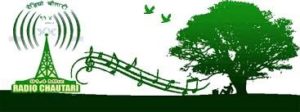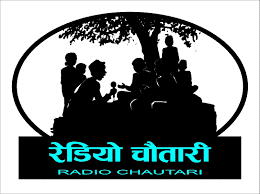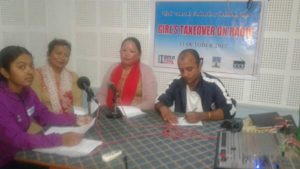
Radio Chautari was started after the end of the conflict in Nepal as an initiative with the basic aim to spread peace among Nepal’s population at the time when people in Nepal were passing through a fragile period of transition from monarchy to republicanism.
The word ‘Chautari’ in the Nepali language, means a rest stop usually found along the foot trails of rural Nepal. And in a country like Nepal, comprising of rugged terrain and higher illiteracy rate, Radio can be considered as the most effective means of communication. So Radio Chautari was started in April 2009 as an initiative of the United Nations Country Team (UNCT) to enhance the efforts of the United Nations in Nepal, to communicate with the general Nepali population, particularly in rural communities, about a wide range of issues related to the peace process and since then it has covered various issues related to peace process and socio-economic transformation. The program aims at giving the people information on five main topics – health, foreign employment, gender equality and the constitution-making process.

Radio Chautari broadcasts a weekly radio programme through the national network, Kantipur FM, and on 25 local FM stations through the Ujyaalo 90 Network. The programmes are broadcasted once a week during primetime on each network – on Saturdays at 7.30 am through the Ujyaalo Network and on Wednesdays at 7.30 am on Kantipur FM. The programmes are also posted on the UN Information Centre’s website. Radio Chautari also broadcasts two Public Service Announcements(PSA), of one-minute duration each, daily on Kantipur FM and on 53 stations of the Ujyaalo network. These PSAs also deal with key peace and development issues and are another tool for the UNCT to disseminate key messages. These are aired on super-prime-time, immediately before or after the news on these stations. From April 2009 to September 2011, 112 weekly episodes of Radio Chautari were broadcasted. Through internal surveys, Ujyaalo estimates the listenership of the 25 local FM stations at about 18 million.
Also in order to reach a diverse population as possible, the program and PSAs are broadcasted in Nepali and five other languages, namely Maithili, Awadhi, Tharu, Tamang and Bhojpuri, that serve some of the largest ethnic populations in the country.
In Nepal, the use of the radio has increased public awareness of women rights. According to people of Nepal, Radio Chautari every week helped in realizing the problems and concerns of people leaving in remote areas and so plays a major role in spreading the voice of rural people directly to the policymakers. More and more people were encouraged to become involved in various activities related to transitional process after listening to the program. Every week, the team of Radio Chautari traveled to rural and remote areas of Nepal to talk to ordinary Nepalis and heard their opinions and aspirations on Nepal’s development.

“By drawing attention to short-term political priorities without losing sight of the longer-term peace-building agenda and by captivating such a significant portion of the Nepali population, Radio Chautari became a success,” explains Sangeeta Thapa, Acting Deputy Representative, UN Women, Nepal.
Targeting 55 districts, the joint United Nations initiative helped support Nepal’s transitional process towards a more inclusive and just society. These agencies included UN Women, UNICEF, UNDP and UNFPA, and other UN Agencies in Nepal. Every week, the agencies of the United Nations worked with the radio team to explore issues for the programme, identify messages, interviewers, and districts for field reporting.
UN Women’s technical and financial support helped produce some episodes that were focused on women migrant workers, unemployment challenges of the youth, maternal mortality, gender- budgeting, trafficking of women and equitable access to justice and also spread awareness about a community service center for protection to those affected by violence through its programs.
Radio Chautari also caught the attention of policymakers and government agencies on issues such as the Comprehensive Peace Accord, Nepal’s Peace and Development Strategy, or the Three Year Plans of the Government. It had also organized a panel discussion in partnership with Centre for Constitutional Dialogue(CCD) to track constitution-making process.

